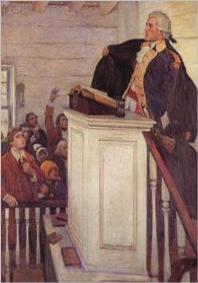
He had to continually travel under harsh conditions and for a long time ministered to German Lutheran and Reformed congregations in Pennsylvania, Maryland, the Shenandoah Valley of Virginia and in New York. He is thought of as the founder of the Lutheran Church in America. In his travels, he met Conrad Weiser’s daughter and married her in 1745.
Expert frontiersman Conrad Weiser was William Penn’s chief negotiator with the Indians from the 1730’s through the 1750’s. He had come to America at age 14 with the Palatinate Germans in New York. His father sent him to live with the Mohawks at age 16 to learn their language, and he was adopted into their family. For 15 years, Weiser learned the Indian language, habits and customs. After the New York troubles, the Weisers and other Palatines relocated to eastern Pennsylvania where Weiser would spend the rest of his life. Weiser regularly corresponded with Halle’s August Hermann Francke.
In 1731, Weiser, armed with his knowledge of frontier skills, was the Provincial Indian Interpreter and Agent at a meeting between the provincial council and Shekilammy, the Chief of the Six Nations Federation. Weiser devoted his remaining years to interpreting the thoughts and words of the Indians to white men. Weiser strove more than any other man of his time to see friendship maintained between the two. Later, after marrying a German-born woman, the couple joined the celibate order at Ephrata after being moved by their preaching in 1735, and although they left within two years, he remained interested in religion all his life.
It must have been a strong combination of genes. The three Muhlenberg sons were all successful. The Muhlenbergs sent their three sons to Halle for their education in 1763. Henry August Muhlenberg became a noted botanist and was often described as “the American Linnaeus.” He was founder and president of Franklin College in Lancaster, Pennylvania (established as a German college), and a member of the Göttingen and Berlin philosophical and scientific societies. He was visited by Alexander von Humboldt in 1807. Frederick Muhlenberg was also a minister, and became a member of the Continental Congress in 1779. A collaborator of Alexander Hamilton, he served four terms in the U.S. Congress and was the first Speaker of the U.S. House of Representatives.
THE INDIAN WARS OF PENNSYLVANIA. From an old manuscript:
“The Rev. Henry Melchior Muhlenberg relates in the ‘Hallische Nachrichten,’ a touching incident: It was of the widow of John Hartman who called at his house in February, 1765, who had been a member of one of Rev. Kurtz’s congregations. She and her husband had emigrated to this country from Reutlingen, Wurtemberg, and settled on the frontiers of Lebanon County. The Indians fell upon them in October, 1755, killed her husband, one of the sons, and carried off two small daughters into captivity, whilst she and the other son were absent. On her return she found the home in ashes, and her family either dead or lost to her, whereupon she fled to the interior settlements at Tuipehocken and remained there. |

He was licensed as a Lutheran minister in 1769 and assisted his father with congregations in New Jersey before marrying Hannah Meyer. Next he preached at Woodstock in Virginia’s Shenandoah Valley, a settlement of Pennsylvania Lutherans. Since Anglicanism was the established state church in Virginia, he had to travel to London to receive ordination as an Anglican clergyman.
He was an admirer of Patrick Henry and became a friend of George Washington. His relatives once related the following story: One January Sunday in 1776, while giving a sermon taken from Ecclesiastes 3:1, he suddenly ended it with these words: “There is a time for all things..a time to preach and a time to pray; but there is also a time to fight, and that time has now come.” He took off his clerical robes, revealing his full Colonel’s uniform underneath and proceeded to the door. Ordering a drumbeat for recruits, he stood proudly while 300 men of his congregation responded at once. This group became the 8th Virginia Regiment or the “German Regiment.” A faithful, efficient officer trusted by both General Washington and General Steuben, Peter Muhlenburg successfully engaged in a number of battles and rose to the rank of Major General in the Continental Army.
He played key roles at Brandywine, Germantown, Monmouth and in the Southern Campaign that culminated at Yorktown. After the War, Muhlenberg did not feel he could return to being a parson after having been a soldier, and in 1784 he surveyed military bounty lands assigned to Virginia veterans. He returned to his native Montgomery County, Pennsylvania, and in 1784 his German neighbors elected him as Montgomery County’s representative to Pennsylvania’s Supreme Executive Council, the state’s governing body under its first constitution. After a three-year term, he served as Vice-President of the Commonwealth, and then served three terms in the U.S. Congress. He was elected Senator in 1801 but never served, having resigned to accept an appointment from President Jefferson as Supervisor of the Revenue for Pennsylvania and collector of customs in Philadelphia.